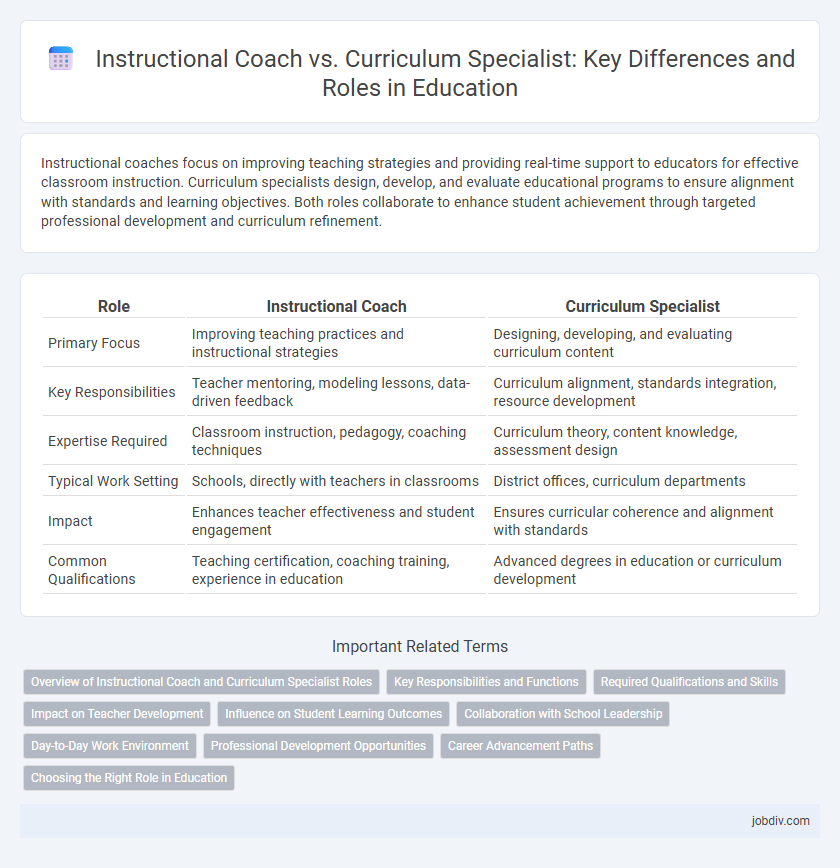Instructional coaches focus on improving teaching strategies and providing real-time support to educators for effective classroom instruction. Curriculum specialists design, develop, and evaluate educational programs to ensure alignment with standards and learning objectives. Both roles collaborate to enhance student achievement through targeted professional development and curriculum refinement.
Table of Comparison
| Role | Instructional Coach | Curriculum Specialist |
|---|---|---|
| Primary Focus | Improving teaching practices and instructional strategies | Designing, developing, and evaluating curriculum content |
| Key Responsibilities | Teacher mentoring, modeling lessons, data-driven feedback | Curriculum alignment, standards integration, resource development |
| Expertise Required | Classroom instruction, pedagogy, coaching techniques | Curriculum theory, content knowledge, assessment design |
| Typical Work Setting | Schools, directly with teachers in classrooms | District offices, curriculum departments |
| Impact | Enhances teacher effectiveness and student engagement | Ensures curricular coherence and alignment with standards |
| Common Qualifications | Teaching certification, coaching training, experience in education | Advanced degrees in education or curriculum development |
Overview of Instructional Coach and Curriculum Specialist Roles
Instructional coaches support teachers by providing personalized professional development, classroom observation, and feedback to improve instructional practices and student outcomes. Curriculum specialists analyze, develop, and implement educational materials and standards to ensure alignment with academic goals and state requirements. Both roles collaborate with educators but differ in focus: instructional coaches target teaching methods while curriculum specialists focus on content and curriculum design.
Key Responsibilities and Functions
Instructional Coaches primarily focus on improving teaching practices by providing personalized support, modeling lessons, and facilitating professional development for educators. Curriculum Specialists concentrate on designing, evaluating, and implementing educational curricula to align with standards and learning objectives across grade levels. Both roles collaborate to enhance student achievement, but Instructional Coaches emphasize teacher effectiveness, while Curriculum Specialists prioritize curriculum coherence and relevancy.
Required Qualifications and Skills
Instructional Coaches require strong expertise in pedagogy, classroom management, and adult learning theories, typically holding a teaching license and several years of classroom experience. Curriculum Specialists need deep knowledge of curriculum design, assessment development, and content standards, often possessing advanced degrees in education or curriculum development. Both roles demand excellent communication skills, data analysis proficiency, and the ability to collaborate with educators to improve student outcomes.
Impact on Teacher Development
Instructional Coaches provide personalized support and real-time feedback to teachers, enhancing instructional practices and boosting classroom effectiveness. Curriculum Specialists design and refine educational materials and standards, ensuring alignment with learning objectives and systemic coherence. Both roles significantly impact teacher development by fostering continuous professional growth and improving instructional quality.
Influence on Student Learning Outcomes
Instructional Coaches directly impact student learning outcomes by collaborating with teachers to implement effective teaching strategies and provide personalized feedback. Curriculum Specialists influence outcomes through designing and refining curriculum frameworks that align with educational standards and student needs. Both roles enhance academic achievement but differ in their approach: Instructional Coaches work in classrooms, while Curriculum Specialists shape the instructional content and structure.
Collaboration with School Leadership
Instructional Coaches work closely with school leadership to implement effective teaching strategies and provide real-time classroom support, enhancing instructional practices through continuous collaboration. Curriculum Specialists partner with administrators to align curriculum standards with school goals, ensuring rigorous and coherent academic programs. Both roles are essential for fostering a collaborative environment that promotes teacher development and student achievement.
Day-to-Day Work Environment
Instructional Coaches primarily engage in classroom observations, providing real-time feedback, and conducting professional development sessions to support teachers' instructional strategies. Curriculum Specialists focus on developing, evaluating, and revising educational content and resources to align with academic standards and learning outcomes. Both roles involve collaboration with educators, but Instructional Coaches work directly in classrooms while Curriculum Specialists operate more in planning and resource management.
Professional Development Opportunities
Instructional coaches provide tailored professional development by modeling teaching techniques and offering real-time feedback to improve instructional practices. Curriculum specialists design comprehensive training programs aligned with state standards to enhance educators' content knowledge and pedagogical skills. Both roles drive professional growth but differ in approach: coaches emphasize personalized support, while specialists focus on curriculum alignment and resources.
Career Advancement Paths
Instructional Coaches primarily focus on enhancing teachers' classroom practices through personalized coaching, leading to roles such as Teacher Leader or Professional Development Coordinator. Curriculum Specialists concentrate on designing and implementing curriculum frameworks, advancing toward positions like Curriculum Director or Academic Program Manager. Both career paths offer opportunities for growth within educational leadership, emphasizing either instructional improvement or curriculum development.
Choosing the Right Role in Education
Instructional coaches focus on improving teaching strategies and supporting teachers in classroom implementation, while curriculum specialists develop and align curriculum content with educational standards. Selecting the right role depends on whether the priority is enhancing teacher performance or designing comprehensive curriculum frameworks. Both positions are essential for driving student achievement and educational effectiveness in schools.
Instructional Coach vs Curriculum Specialist Infographic

 jobdiv.com
jobdiv.com